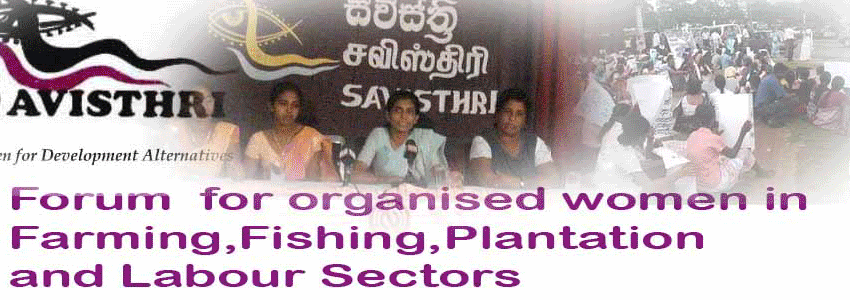Savisthri conducted a training workshop
on developing leadership skills for District members on 27th – 28th
May 2012 at Sarvodaya Training Centre, Bandaragama.
The objective of the training is
to view Savisthiri member’s consideration & suggestion in new development
projects in the reorganized Savisthri structure and to enhance their leadership
skills to identify their roles at national and district level.
Five participants from each
district comprising of the Hon. President, Hon. Secretary and Hon. Treasurer of
District women’s collectives and two others who are active with Savisthri
Programmers participated in the leadership training workshop.
The training method included
collective exercise, guided discussion and open brainstorming sessions. Participants
get to know each other and the existing situation of the target population in
each District. Macro pictures covering social, economic, political and cultural
aspects were discussed & analyzed by participants with guidance from
resource person. The problem faced by people in the respective areas was
discussed and the causes and effects of those problems identified. The session
is to understand the way of determining how the power should be vested with and
to empower the participant’s knowledge and enable them to understand the
existing domination structure in target population where the poor, marginalized,
vulnerable are excluded from communities based on class, ethnicity, gender
& caste.
A gap analysis of the existing
situation and expected situation was discussed on the second day. Development is
the right of the people and they have the right to participate in designing
development projects with special emphasis on women. It is the responsibility
of the people to actively participate in development project activities to
contribute towards a change in society. The activities for expected situation were
analyzed with present activities and how it will contribute towards Savisthri’s
vision & mission. It was observed that the present activities contributed
more towards economic development than social and there was consensus among
participants that Savisthri need to focus on activities on social development.
A group session to develop future
action plan was discussed by member on following matters,
To include new villages and new
members in the projects.
Strengthen & organize the
small groups, mini society and district women
collectives
Expand activities in education, manufacturing,
service oriented to promote
Savisthri Vision.
Challenges…and difficulties.
Each District group will develop
their future plans and send it to National office in the first week of
July.
Further, the workshop covered sessions
on leadership and its qualities such as knowledge, skills and attitude etc, Savisthri
Vision and mission, identify & select quality leaders in mini societies,
small groups and district women collectives that they are dedicated to their
respective community contributing to Savisthri vision and mission.
Finally an evaluation was held among
participants. We found the workshop was useful and the participants were able
to understand the responsibility of Savisthri members. Many are applying the
lessons learnt during training workshop in the field sites.






















.png)
.png)

.png)
.png)
.png)
.png)